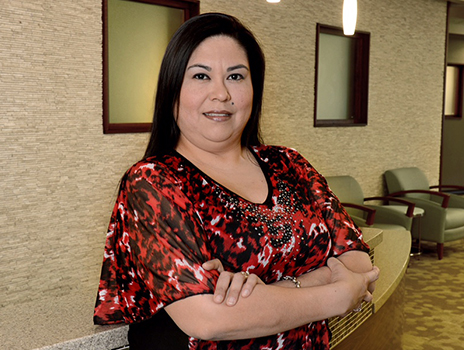- Home
- News Room
- Patient Stories Search Page
- Fighting Colon Cancer with a Clinical Trial
August 13, 2019
Treatment for advanced colon cancer took its toll on Corina Ramirez, a young mother of 2. Physically and emotionally drained from chemotherapy, she was unable to care for her family the way she wanted.
“Chemo can save your life, but it takes from you. I felt inadequate because I had people helping me do everything,” says Corina, 37, who also suffered from “chemo brain” (forgetfulness) and exhaustion.
All of that changed last year when Corina enrolled in an innovative clinical trial at The University of Kansas Cancer Center, the region’s only National Cancer Institute-designed cancer center. The early-phase immunotherapy study has shown promising results in patients with Corina’s particular type of disease, says Raed Al-Rajabi, MD, her medical oncologist at the cancer center.
Corina, whose cancer was no longer responding to chemotherapy, says a friend advised her to contact the cancer center about a clinical trial. Once in the study, she says she knew almost immediately the treatment was working.
“Because of the clinical trial, I have a life with my children,” she shares.
Living life again
Corina was originally diagnosed with colon cancer in February 2015 at another healthcare facility. She had surgery to remove tumors from her colon and aorta, followed by 13 rounds of chemotherapy. At the time, her daughter was just a few months old, and her son was 4.
According to Dr. Al-Rajabi, tests indicated Corina’s cancer had micro-satellite instability, which is a deficiency in a cancer cell’s ability to repair its DNA. "Our cancer center is the only one in the area offering an early-phase immunotherapy trial for colon cancer, paving the way to future treatments," he says.
“The first 2 months I did the infusions, it felt like I had pop rocks in my stomach, so I assumed the treatment was doing its work,” recalls Corina, who lives in North Kansas City, Missouri. Eight weeks later, a scan revealed her tumor had shrunk by nearly 50%. Her progress continues at a slower but steady pace, and she says the immunotherapy has dramatically improved her quality of life.
“I’m involved with my son in his school activities. I go in every 2 weeks for infusions and I take pills every day, but it doesn’t affect the time I have with my family,” Corina says. She even joined her family on a trip to Florida, where they visited Walt Disney World and the beach.
“I could do it all,” she says. “Now I can think a little bit toward the future, but I don’t take anything for granted. Every day is a blessing, and I remember every day that God and The University of Kansas Cancer Center are the reasons I am here.”
Improving treatment and care
Through the trial, Corina receives a combination of 2 drugs that boost her immune system. Dr. Al-Rajabi says immunotherapy is well-tolerated, with limited toxicity in most patients. As an alternative to chemotherapy, it may soon become more widely available for patients who don’t respond to standard treatment.
“Our prime directive as an NCI-designated cancer center is to enroll as many patients in clinical trials as possible because clinical trials pave the way to future therapies,” he says. “Our mission is to advance gastrointestinal oncology care here at The University of Kansas Cancer Center, and we’re doing it one clinical trial at a time.”

